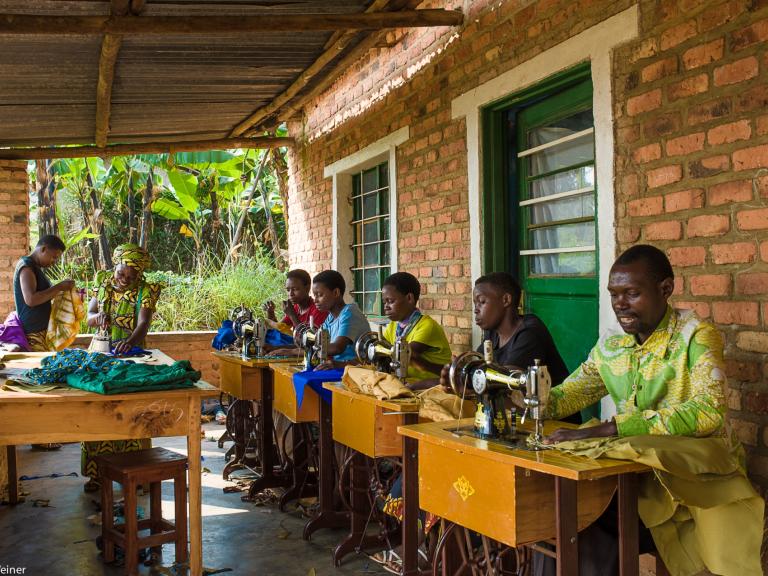-
Last updated on

The Egmont Palace in Brussels has been illuminated in the colors of the rainbow flag from Sunday, May 16 to Tuesday, May 18, 2021. © FOD BZ/SPF AE
In many parts of the world, LGBTIQ people (lesbian, gay, bisexual, trans and intersex, queer) still face severe forms of discrimination, intimidation and violence. Relationships between people of the same sex are considered a punishable act in 67 UN member states. In 42 UN member states, there are restrictions on the freedom of expression relating to sexual and gender diversity. Only 63 countries offer a form of protection against discrimination.
Equal rights for LGBTIQ people are therefore far from guaranteed. In some countries, such rights are even being scaled down. For Belgium this is unacceptable. Combatting all types of discrimination, including anti-LGBTIQ discrimination and racism, is a top priority for our country.
Leading the way
When it comes to LGBTIQ rights, Belgium is definitely a leader. This is demonstrated each year again by the excellent score achieved by our country in the Rainbow Europe Index by ILGA-Europe, the European umbrella organisation bringing together organisations defending the interests of LGBTIQ people. In Europe, with its score of 74% in 2021, Belgium is beaten only by Malta (with a score of 94%). The index is based on a variety of criteria relating to e.g. non-discrimination, family, hate crimes & hateful language, legal recognition and asylum.
Furthermore, Belgium continues to amend its policy and legislation. A new LGBTIQ action plan is in development, and its focus includes the prevention of hate speech at work, in schools and in the media. Also, it is intended to increase the penalties for hate crimes. The gender law from 2018 focuses on respect and empowerment for transgender people. In addition, a legislative initiative is underway to allow people identifying themselves neither as male nor female to register under a 3rd gender.
International fora
Belgium also expresses its vision in diverse international fora. As such, our country supports the initiatives taken by the UN Human Rights Council on LGBTIQ rights, such as the creation of a mandate of independent expert SOGI (Sexual Orientation & Gender Identity). Within the Organisation for Security and Co-operation in Europe (OSCE) Belgium has been fighting for a thorough investigation of alarming discrimination and lethal violence against LGBTIQ people in Chechnya.
In 2016, our country was one of the founding members of the Equal Rights Coalition, a coalition of more than 40 countries joining forces at an international level to uphold the human rights of LGBTIQ people. Within the European Union, our country has actively participated in the development of guidelines aimed at respecting LGBTIQ rights. In 2018, Belgium hosted the ILGA-Europe Conference.
In Africa, the Belgian Development Co-operation is supporting a project conducted by Çavaria, the Flemish umbrella organisation for LGBTIQ organisations. Çavaria works together with 18 local LGBTIQ associations and their coalition in the Great Lakes region. The project focuses on financial sustainability and organisation development. Exchanges will take place about sexual and gender diversity, human rights and the forming of coalitions and co-operations.

On the initiative of the Belgian Embassy in Warsaw, the Palace of
Culture and Science was illuminated in rainbow colours in 2020.
This was done in consultation with the City of Warsaw (owner of the Palace) and with co-financing from the Norwegian and Dutch colleagues. © Ambassade Warschau
IDAHOT
Our foreign missions display a similar tolerance when it comes to LGBTIQ people. Every year, 17 May – IDAH0T, International Day Against Homophobia, Transphobia and Biphobia – is an ideal opportunity to put this message in the spotlight. In Poland, for example, 50 embassies from like-minded countries, including Belgium, publish a common letter showing their support to the local LGBTIQ community. In 2020, our embassy in Warsaw took charge of the initiative. This year, our missions in Dublin (Ireland) and Bucharest (Romania) will coordinate a similar initiative.
Our missions are very active on social media as well. Indeed, our embassy in Dublin posted a communal video from all like-minded countries. Our embassies could also hang up posters declaring the embassies as a safe zone for LGBTIQ people. At the headquarters in Brussels, Egmont Palace was illuminated in the colours of the rainbow (see photo above).
Belgium will do everything possible to continue fighting for LGBTIQ rights. Not so much to enforce a West-European standard but as a positive message about a warm, inclusive society in which every person enjoys equal rights.

Our post in Nur-Sultan (Kazakhstan) declared the building an LGBTIQ safe zone (17 May 2021).

Our post in Abidjan raised the rainbow flag on 17 May 2021.
More on People

Lifting people out of extreme poverty? It is possible!
To lift the most vulnerable people out of their misery, it takes more than just providing them with resources and broadening the...

Gender equality is central to Belgian foreign policy
Gender equality and women's rights are an absolute priority in Belgian domestic and foreign policy.

Inequality puts enormous pressure on man and the planet
The COVID-19 pandemic has come to highlight the disrupted relationship between humans and the planet. This is why we need to wor...
